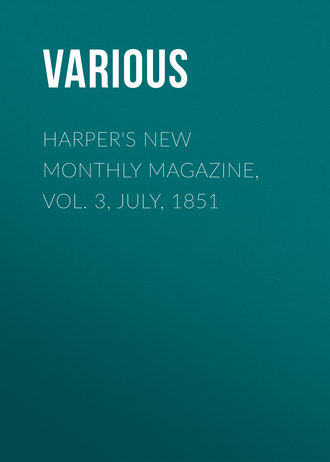 полная версия
полная версияHarper's New Monthly Magazine, Vol. 3, July, 1851
"Common Sense" was printed and scattered by thousands over the land. In the army it was read by the captains at the head of their companies, and at public gatherings its strong but just language was greeted with loud acclaim. Neighbor read it to neighbor, and within three months after its appearance a desire for absolute independence of Great Britain glowed in almost every patriot bosom, and found expression at public meetings, in the pulpit, and in social circles.
The Colonial Assemblies soon began to move in the matter. North Carolina was the first to take the bold, progressive step toward independence. By a vote of a convention held on the 22d of April, 1776, the representatives of that State in the Continental Congress were authorized "to concur with those in the other colonies, in declaring independence." Eleven months earlier than this, a meeting at Charlotte, in Mecklenburg County, forswore allegiance to the British crown.
On the 10th of April, the General Assembly of Massachusetts requested the people of that colony, at the approaching election of new representatives, to give them instructions on the subject of independence. Pursuant to this request, the people of Boston, in town meeting assembled on the 23d, instructed their representatives to use their best endeavors to have their delegates at Philadelphia "advised, that in case Congress should think it necessary for the safety of the united colonies, to declare themselves independent of Great Britain, the inhabitants of that colony, with their lives and the remnants of their fortunes, would most cheerfully support them in the measure."
The Convention of Virginia passed a similar resolution on the 17th of May, and then proceeded to the establishment of a regular independent government for the colony. In its instructions the Virginia Convention directed its representatives to propose a declaration of independence. The General Assembly of Rhode Island adopted a similar resolution the same month, and also directed the usual oath of allegiance, thereafter, to be given to the State of Rhode Island, instead of to the King of Great Britain.
On the 8th of June the New York delegates in Congress asked for special instructions on the subject, but the Provincial Assembly, deeming itself incompetent to instruct in so grave a matter without the previous sanction of the people, merely recommended the inhabitants to signify their sentiments at the election just at hand. The New York delegates were never instructed on the subject, and those who signed the Declaration did so upon their own responsibility. But when a copy of the Declaration reached the Provincial Assembly of New York, then in session at White Plains, that body passed a resolution of approval, and directed their delegates to act in future, as the public good might require.
The Assembly of Connecticut, on the 14th of June, instructed their delegates "to give the assent of the colony to such Declaration, when they should judge it expedient." On the 15th the New Hampshire Provincial Congress issued similar instructions; and on the 21st the new delegates from New Jersey were directed to act in the matter according to the dictates of their own judgments.
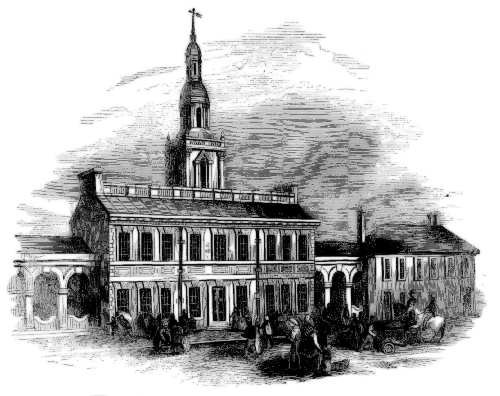
THE STATE HOUSE, OR INDEPENDENCE HALL, AS IT APPEARED IN 1776.
In the Pennsylvania Assembly, several months previously, the subject of independence had been hinted at. The Conservatives were alarmed, and procured the adoption of instructions to their delegates, adverse to such a measure. In June these restrictions were removed, and they were neither instructed nor officially permitted to concur with the other colonies in a declaration of independence. But a convention of the people, held in Philadelphia on the 24th of June, expressed their willingness and desire to act in concert with those of the other colonies, and requested the representatives of that province to vote affirmatively.
The Convention of Maryland, by a resolution adopted at about the close of May, positively forbade their delegates voting for independence; but through the influence of Carroll, Chase, Paca, and others, the prohibition was recalled on the 28th of June, and they were empowered to give a vote for Maryland concurrent with the other provinces. Delaware, South Carolina, and Georgia refrained from action on the subject, except such as occurred at small district meetings, and their delegates were left free to vote as they pleased. So rapid was the change in public opinion after the British troops were driven out of Boston, that within the space of sixty-five days, the representatives of ten of the thirteen colonies were specially instructed by their constituents to sever the political tie which bound them to Great Britain.
The Continental Congress, now in permanent session, was assembled in the State House in Philadelphia, a spacious building yet standing—a relic of rarest interest to the American, because of the glorious associations which hallow it.
"This is the sacred fane wherein assembledThe fearless champions on the side of Right;Men at whose Declaration empires trembled,Moved by the Truth's clear and eternal light."This is the hallowed spot where first, unfurling,Fair Freedom spread her blazing scroll of light;Here, from Oppression's throne the tyrant hurling,She stood supreme in majesty and might."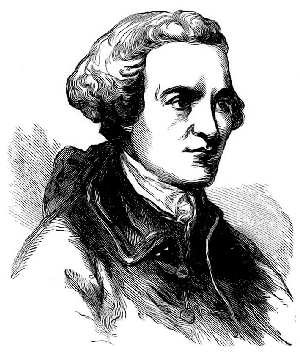
JOHN HANCOCK.
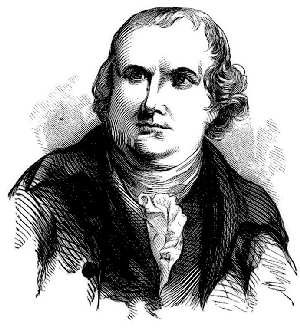
ROBERT MORRIS.
Stimulated by affirmative action in the various colonies, the desire for independence became a living principle in the hall of the Continental Congress, and that principle found utterance, albeit with timorous voice. John Hancock, an opulent merchant of Boston, and from the commencement of difficulties in 1765, a bold, uncompromising, zealous, and self-sacrificing patriot, was seated in the presidential chair, to which he had been called a year previously, when Peyton Randolph, the first incumbent, was summoned to the bedside of his dying wife in Virginia. The equally bold and uncompromising Adamses were his colleagues, from Massachusetts Bay. On his right sat Franklin of Pennsylvania, Sherman of Connecticut, Rutledge of South Carolina, and young Jefferson of Virginia. On his left was the eloquent Dickenson of Pennsylvania, and his colleague, Robert Morris, the financier of the Revolution, whose capital and credit, controlled by untiring energy and love of country, sustained the cause of freedom in the darkest hours of its struggles with tyranny. Near him was the lovely and refined Arthur Middleton of South Carolina, with a heart full of philanthropy, and a mind at ease while he saw his immense fortune melting away before the fire of revolution. In front was Richard Henry Lee, the Cicero of that august assembly, and by his side sat the venerable John Witherspoon of Princeton College, the equally impressive and earnest preacher of the gospel of Christ and the gospel of civil liberty. Near the President's chair sat the attenuated, white-haired secretary, Charles Thomson, who for fifteen years held the pen of the old Congress, and arranged, with masterly hand, its daily business. On every side were men, less conspicuous but equally zealous, bearing upon their shoulders a responsibility unparalleled in the history of the world in importance, whether considered in the aspect of immediate effects or prospective results.
On the 10th of May, the initial step toward independence was taken by Congress, when it was resolved, "that it be recommended to the several assemblies and conventions of the United Colonies, where no government, sufficient to the exigencies of their affairs, hath hitherto been established, to adopt such a government as shall, in the opinions of the representatives of the people, best conduce to the happiness and safety of their constituents in particular, and America in general." A preamble to this resolution was prepared by a committee, consisting of John Adams, Edward Rutledge, and Richard Henry Lee, in which the principles of independent sovereignty were clearly set forth. It was declared "irreconcilable to reason and a good conscience for the colonists to take the oaths required for the support of the government under the crown of Great Britain." It was also declared necessary, that all royal rule should be suppressed, and all "the powers of government exerted under the authority of the people of the colonies, for the preservation of internal peace, virtue, and good order, as well as for the defense of their lives, liberties, and properties, against the hostile invasions, and civil depredations of their enemies." This language was certainly very bold, but not sufficiently positive and comprehensive, as a basis of energetic action, in favor of independence. The hearts of a majority in Congress now yearned with an irrepressible zeal for the consummation of an event which they knew to be inevitable; yet there seemed to be no one courageous enough in that assembly to step forth and take the momentous responsibility of lifting the knife that should dismember the British Empire. The royal government would mark that man as an arch-rebel, and all its energies would be brought to bear to quench his spirit, or to hang him on a gibbet.1
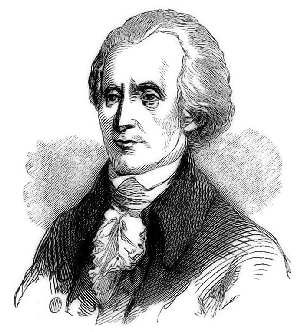
RICHARD HENRY LEE.
We have seen that Virginia instructed her representatives in Congress to propose independence: she had a delegate equal to the task. In the midst of the doubt, and dread, and hesitation, which for twenty days had brooded over the National Assembly, Richard Henry Lee arose, and with his clear, musical voice read aloud the resolution, "That these United Colonies are, and of right ought to be, free and independent States; and that all political connection between us and the State of Great Britain is, and ought to be totally dissolved." John Adams immediately arose and seconded the resolution. To shield them from the royal ire, Congress directed the secretary to omit the names of its mover and seconder in the journals. The record says, "Certain resolutions respecting independence being moved and seconded, Resolved, That the consideration of them be deferred until to-morrow morning; and that the members be enjoined to attend punctually at ten o'clock, in order to take the same into their consideration."
The resolution was not taken up for consideration, until three days afterward, when it was resolved to "postpone its further consideration until the first day of July next; and in the mean while, that no time be lost, in case Congress agree thereto, that a committee be appointed to prepare a declaration to that effect." That committee was appointed on the eleventh of June, and consisted of Thomas Jefferson of Virginia, John Adams of Massachusetts, Benjamin Franklin of Pennsylvania, Roger Sherman of Connecticut, and Robert R. Livingston of New York. Mr. Lee would doubtless have been appointed the chairman of the committee, had not intelligence of the serious illness of his wife compelled him, the evening previous to its formation, to ask leave of absence. At the hour when the committee was formed, Mr. Lee was in Wilmington, on his way to Virginia. Mr. Jefferson, the youngest member of the committee, was chosen by his colleagues to write the Declaration, because of his known expertness with the pen; and in an upper chamber of the house of Mrs. Clymer, on the southwest corner of Seventh and High-streets, in Philadelphia, that ardent patriot drew up the great indictment against George the Third, for adjudication by a tribunal of the nations.
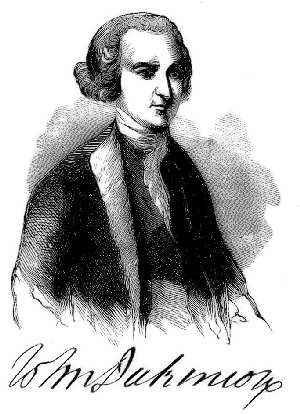
JOHN DICKENSON.
On the first of July, pursuant to agreement, Mr. Lee's resolution was taken up in the committee of the whole house, Benjamin Harrison of Virginia (father of the late President Harrison), in the chair. Jefferson's draft of a declaration of independence, bearing a few verbal alterations by Franklin and Adams, was reported at the same time, and for three consecutive days its paragraphs were debated, altered, and agreed to, one after another. No written record has transmitted to us the able arguments put forth on that occasion, and the world has lost all except a few reminiscences preserved by those who listened to, and participated in the debates. While all hearts were favorable to the measure, all minds were not convinced that the proper time had arrived for "passing the Rubicon." Among the opponents of the resolution was John Dickenson of Pennsylvania, whose powerful arguments in a series of Letters of a Pennsylvania Farmer, published eight years before, had contributed greatly toward arousing the colonies to resistance. He did not regard the measure as impolitic at all times, but as premature and impracticable at that time. He urged the want of money, munitions of war, of a well-organized and disciplined army; the seeming apathy of several colonies, manifested by their tardiness in declaring their wishes on the subject; the puissance of Great Britain by sea and land, and the yet unknown course of foreign governments during the contest which would follow. Richard Henry Lee, on the other hand, had supported his resolution with all his fervid eloquence, in Congress and out of it, from the day when he presented it. He prefaced his motion with a speech, which his compatriots spoke of in terms of highest eulogium. He reviewed with voluminous comprehensiveness the rights of the colonists, and the violation of those rights by the mother country. He stated their resources, descanted upon the advantages of union daily drawing closer and closer as external danger pressed upon them, and their capacity for defense. He appealed to the patriotism of his compeers, portrayed the beauties of liberty with her train of blessings of law, science, literature, arts, prosperity and glory; and concluded with these beautiful thoughts: "Why, then, sir, do we longer delay? Why still deliberate? Let this happy day give birth to an American Republic! Let her arise, not to devastate and conquer, but to re-establish the reign of peace and law. The eyes of Europe are fixed upon us; she demands of us a living example of freedom, that may exhibit a contrast, in the felicity of the citizen, to the ever-increasing tyranny which desolates her polluted shores. She invites us to prepare an asylum, where the unhappy may find solace, and the persecuted repose. She entreats us to cultivate a propitious soil, where that generous plant, which first sprung and grew in England, but is now withered by the blasts of Scottish tyranny [alluding to Bute, Lord Mansfield, and other Scotch advocates of the right of Great Britain to tax America], may revive and flourish, sheltering under its salubrious and interminable shade, all the unfortunate of the human race. If we are not this day wanting in our duty to our country, the names of the American legislators of '76 will be placed by posterity at the side of those of Theseus, of Lycurgus, of Romulus, of Numa, of the three Williams of Nassau, and of all those whose memory has been, and forever will be dear to virtuous men and good citizens."
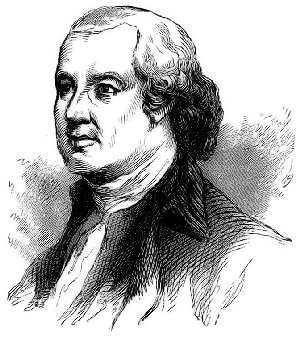
EDWARD RUTLEDGE.
Edward Rutledge of South Carolina, the youngest member of Congress, being only twenty-five, was one of Mr. Lee's chief supporters, by his persevering industry, his charming conversation, and his impressive eloquence in debate. He was loved as a son by that stern and unyielding Puritan, Samuel Adams, then at the vigorous old age of fifty-four. He, too, with a voice that was never heard with inattention, supported the resolution; and indignantly rebuking what he was pleased to call a "temporizing spirit" among those who timidly opposed it, he exclaimed, "I should advise persisting in our struggle for liberty and independence, though it were revealed from Heaven that nine hundred and ninety-nine were to perish, and only one of a thousand were to survive, and retain his liberty! One such freeman must possess more virtue, and enjoy more happiness, than a thousand slaves; and let him propagate his like, and transmit to them, what he hath so nobly preserved." Such lofty sentiments possessed great potency at that perilous hour, when the stoutest heart was tremulous with emotion.
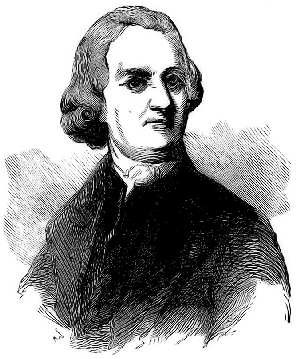
SAMUEL ADAMS.
Dr. Witherspoon, of the same ripe age as Mr. Adams, who had left the seat of learning at Princeton and the quiet pathways of a Christian shepherd, and took a seat in the national council, also urged, with all the power and pathos of his eloquence, delivered in broad Scotch accents, and marked by broad Scotch common sense, the immediate adoption of the resolution. While John Dickenson was eloquently pleading with his compeers, to postpone further action on the subject, and said "the people are not ripe for a declaration of independence," Doctor Witherspoon interrupted him and exclaimed, "Not ripe, sir! In my judgment we are not only ripe, but rotting. Almost every colony has dropped from its parent stem, and your own province, sir, needs no more sunshine to mature it!"
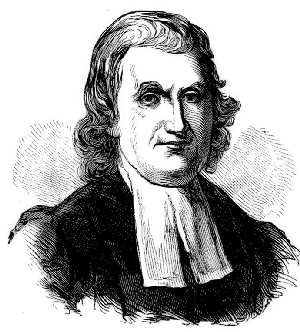
JOHN WITHERSPOON.
Although it was evident from the first, that a majority of the colonies would vote for the resolution, its friends were fearful that unanimous assent could not be obtained, inasmuch as the Assemblies of Pennsylvania and Maryland had refused to sanction the measure, and New York, South Carolina and Georgia were silent. The delegates from Maryland were unanimously in favor of it, while those from Pennsylvania were divided. When, on the first of July, a vote was taken in Committee of the whole House, all the colonies assented, except Pennsylvania and Delaware; four of the seven delegates of the former voting against it, and the two delegates from Delaware, who were present, were divided. Thomas M'Kean favored it, and George Read (who afterward signed it), opposed it. Mr. M'Kean burning with a desire to have his State speak in favor of the great measure, immediately sent an express after his colleague, Cæsar Rodney, the other Delaware delegate, then eighty miles away. Rodney was in the saddle within ten minutes after the arrival of the messenger, and reached Philadelphia on the morning of the fourth of July, just before the final vote was taken. Thus Delaware was secured. Robert Morris and John Dickenson of Pennsylvania were absent; the former was favorable, the latter opposed to the measure. Of the other five who were present, Doctor Franklin, James Wilson, and John Morton were in favor of it; Thomas Willing, and Charles Humphreys were opposed to it; so the State of Pennsylvania was also secured. At a little past meridian, on the Fourth of July 1776, a unanimous vote of the thirteen colonies was given in favor of declaring themselves Free and Independent States. A number of verbal alterations had been made in Mr. Jefferson's draft, and one whole paragraph, which severely denounced Slavery was stricken out, because it periled the unanimity of the vote. In the journal of Congress for that day, is this simple record:
"Agreeably to the order of the day, the Congress resolved itself into a committee of the whole, to take into their further consideration, the Declaration; and after some time, the President resumed the chair, and Mr. Harrison reported, that the Committee have agreed to a Declaration, which they desired him to report. The Declaration being read, was agreed to as follows:
"A DECLARATION OF THE REPRESENTATIVES OF THE UNITED STATES OF AMERICA IN CONGRESS ASSEMBLED.
"When, in the course of human events, it becomes necessary for one people to dissolve the political bands which have connected them with another, and to assume among the powers of the earth the separate and equal station to which the laws of nature and of nature's God entitle them, a decent respect to the opinions of mankind requires that they should declare the causes which impel them to the separation.
"We hold these truths to be self-evident; that all men are created equal; that they are endowed by their Creator with certain unalienable rights; that among these are life, liberty, and the pursuit of happiness; that, to secure these rights, governments are instituted among men, deriving their just powers from the consent of the governed; that, whenever any form of government becomes destructive of these ends, it is the right of the people to alter or to abolish it, and to institute new government, laying its foundation on such principles, and organizing its powers in such form, as to them shall seem most likely to effect their safety and happiness. Prudence, indeed, will dictate that governments long established should not be changed for light and transient causes; and, accordingly, all experience hath shown that mankind are more disposed to suffer, while evils are sufferable, than to right themselves by abolishing the forms to which they are accustomed. But when a long train of abuses and usurpations, pursuing invariably the same object, evinces a design to reduce them under absolute despotism, it is their right, it is their duty, to throw off such government, and to provide new guards for their future security. Such has been the patient sufferance of these colonies, and such is now the necessity which constrains them to alter their former systems of government. The history of the present king of Great Britain is a history of repeated injuries and usurpations, all having in direct object the establishment of an absolute tyranny over these states. To prove this, let facts be submitted to a candid world:
"He has refused his assent to laws the most wholesome and necessary for the public good.
"He has forbidden his governors to pass laws of immediate and pressing importance, unless suspended in their operation till his assent should be obtained; and, when so suspended, he has utterly neglected to attend to them.
"He has refused to pass other laws for the accommodation of large districts of people, unless those people would relinquish the right of representation in the legislature—a right inestimable to them, and formidable to tyrants only.
"He has called together legislative bodies at places unusual, uncomfortable, and distant from the repository of their public records, for the sole purpose of fatiguing them into compliance with his measures.
"He has dissolved representative houses repeatedly for opposing with manly firmness his invasions on the rights of the people.
"He has refused, for a long time after such dissolutions, to cause others to be elected; whereby the legislative powers, incapable of annihilation, have returned to the people at large for their exercise—the state remaining, in the meantime, exposed to all the dangers of invasion from without and convulsions within.
"He has endeavored to prevent the population of these states—for that purpose obstructing the laws for naturalization of foreigners, refusing to pass others to encourage migration hither, and raising the conditions of new appropriations of lands.
"He has obstructed the administration of justice, by refusing his assent to laws for establishing judiciary powers.
"He has made judges dependent on his will alone for the tenure of their offices and the amount and payment of their salaries.
"He has erected a multitude of new offices, and sent hither swarms of officers to harass our people and eat out their substance.
"He has kept among us, in times of peace, standing armies, without the consent of our legislatures.
"He has affected to render the military independent of, and superior to the civil power.
"He has combined with others to subject us to a jurisdiction foreign to our constitution, and unacknowledged by our laws—giving his assent to their acts of pretended legislation.
"For quartering large bodies of armed troops among us;
"For protecting them, by a mock trial, from punishment for any murders which they should commit on the inhabitants of these states;









